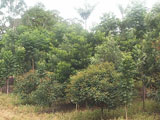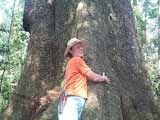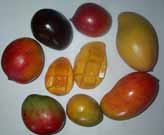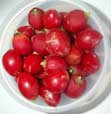March Newsletter 2001
Reafforestation and Regeneration
 How fortunate we are in the North Coast region to not only have remaining patches of remnant vegetation left but to also follow the success of plantings in the region. One project that continues to impress all who visit is Dr Vicki Slinko's 'Boorabie Hills' at Kyogle.
How fortunate we are in the North Coast region to not only have remaining patches of remnant vegetation left but to also follow the success of plantings in the region. One project that continues to impress all who visit is Dr Vicki Slinko's 'Boorabie Hills' at Kyogle.
Vicki purchased 2 hectares of cleared land and reforested using the 'Jack Mitchell's Forest Farming system'. When Vicki visited us to buy the trees she had carried out a lot of research into species selection, preparation and the  ongoing maintenance required. In her own words it was hard work during the initial stages however it the benefits and fast growth in comparison to other plantings is significant. The initial preparation and maintenance included the use of roundup. The use of roundup is continued until sufficient canopy cover is achieved and the trees are maturing and developing strong tap roots. This ensures that the superficial feeder roots don't have to compete with grass and weeds for nutrients.
ongoing maintenance required. In her own words it was hard work during the initial stages however it the benefits and fast growth in comparison to other plantings is significant. The initial preparation and maintenance included the use of roundup. The use of roundup is continued until sufficient canopy cover is achieved and the trees are maturing and developing strong tap roots. This ensures that the superficial feeder roots don't have to compete with grass and weeds for nutrients.
Another important aspect of this forestry method is the implementation of pruning. Different species of trees are pruned in different ways. An example is pruning the majority of lateral growth from White Cedar to encourage upright growth.
The trees were planted out 2 years and 10 months ago with some trees already reaching the five metre mark.
Many of you may have seen Jack Mitchell's book, 'An Introduction to the Successful Growing of Rainforest and Harvestable Timbers'. The book is currently out of print however you may be able to purchase existing copies for approximately $5.00 from Green Harvest at emailgreenhar@ozemail.com.au. Other phone Jack at his nursery on 073 2891288 to recieve a copy of his new book when completed.
One of Natures Giants
 Greg and Carla recently visited the property that houses this magnificent specimen west of Kyogle. The property is in a dry rainforest location and has many old rainforest remants. Fortunately the owner of the property has taken measures to ensure that trees like this one are not disturbed in the future. It is estimated that this Teak Tree was around 9 metres (27 feet) in diameter.
Greg and Carla recently visited the property that houses this magnificent specimen west of Kyogle. The property is in a dry rainforest location and has many old rainforest remants. Fortunately the owner of the property has taken measures to ensure that trees like this one are not disturbed in the future. It is estimated that this Teak Tree was around 9 metres (27 feet) in diameter.
Mango trials at Daley's Fruit Tree Nursery
The staff at Daley's Nursery recently had the enviable task of becoming Mango connoisseurs. A selection of mangoes were judged on their taste, texture and growth characteristics. Those varieties trailed included Valencia Pride, Manzanilla, Keitt, 20/1, Bowen, NamdocMai,  Florigon, Kwan, Kasturi and Lilly. These are just a few of the hundreds of different mangoes available. Most of us are familiar with the Bowen or Kensington Pride, the R2E2, and perhaps the increasingly popular NamdocMai. Whilst these are the most common mangoes seen on the grocery shelves and in deed very tasty they do face very strong competition with some of the lesser-known varieties.
Florigon, Kwan, Kasturi and Lilly. These are just a few of the hundreds of different mangoes available. Most of us are familiar with the Bowen or Kensington Pride, the R2E2, and perhaps the increasingly popular NamdocMai. Whilst these are the most common mangoes seen on the grocery shelves and in deed very tasty they do face very strong competition with some of the lesser-known varieties.
This season has certainly been ideal for Mango production. The mild dry winter ensured that mangoes were not as badly affected with Black spot and Anthracnose and therefore required minimum spraying. Below we look at three mangoes that we recommend as 'winners' in this locality.
The Florigon was definitely the winner in the taste department. The soft flesh is very sweet and melts in your mouth. The fruit has a small seed and very minimal fibre. Considered by some to be too small for the market it certainly makes up for its lack of size with taste. It is an early bearing mango and a good consistent cropper.
The Kwan is similar to the namdocmai, a 'Thai' type mango. It has elongated fruit of a consistent light yellow and grows to around twice the size of the namdocmai. This variety has excellent disease resistance and is a heavy cropper. Performs very well in south eastern Qld and northern coast of NSW.
The Valencia Pride is another excellent choice of mango. The highly coloured fruit is large and beautiful. It is much longer than a bowen and has thin skin and good flesh colour. It is a later bearing mango and is said to set the taste standard.
Because mangoes vary from green to yellow to purplish-red, colour is not an indicator of whether a mango is ripe. The best way to tell is to smell the distinctive mango aroma that announces the fruit is ready for eating. Once ripe, place your mangoes in the fridge. They are delicious when eaten cool, and by putting them in the fridge you will extend their shelf life. Once you remove them from the fridge, eat almost straight away as they deteriorate quickly.
For those people wishing to to be rewarded in the future with their own succulent fresh fruit March is an excellent month to plant. There is adequate rainfall and the plants have time to become well established prior to winter.
Peanut Butter Fruit (Bunchosia argenta)
 We have mentioned before that a few of us are very partial to the taste and texture of the Bunchosia fruit. Over a period of a couple of weeks Greg returned from his regular morning nursery inspection a bit perplexed about how the birds had made such short work of the fruit. As he said, usually there is adequate to share, but these birds weren't missing any at all. Then we discovered the bird - it was Carol who also seems to have developed a fettish for the fruit. Anyway, I can virtually guarantee that if you plant out one of these attractive rainforest trees you'll have plenty of volunteers to share the bountiful harvest with you.
We have mentioned before that a few of us are very partial to the taste and texture of the Bunchosia fruit. Over a period of a couple of weeks Greg returned from his regular morning nursery inspection a bit perplexed about how the birds had made such short work of the fruit. As he said, usually there is adequate to share, but these birds weren't missing any at all. Then we discovered the bird - it was Carol who also seems to have developed a fettish for the fruit. Anyway, I can virtually guarantee that if you plant out one of these attractive rainforest trees you'll have plenty of volunteers to share the bountiful harvest with you.
Eden Seeds
We are very grateful to Alf Finch who recently included our flyer in his mail out of the Eden Seeds Seed Catalogue. For those of you who have never received the catalogue it doubles as an excellent resource guide with valuable information and loads of photographs and sketches. To receive a copy of the catalogue phone: (07) 55331107 (answering machine after hours) or write to M.S. 905 Lower Beechmont Qld 4211.
Special Offer for March Orders
$5 off and 5 FREE tubestock
Many of you may already be aware that we offered $5off and 5 FREE Tubestock Trees to all customers ordering as a result of the flyer they received with the Eden Seeds Catalogue. We would like to extend this offer to all retail/and mail order customers over the month of March. For mail order customers we will select the tubestock for you however, you are welcome to advise us of your needs for eg. Windbreak, Cabinet Timber, Rainforest or Bush Tucker species.
This Month's Most Highly Recommended Site.
Still on the subject of Forest Giants be sure to visit this spectacular site. http://lamington.nrsm.uq.edu.au The site contains brilliant photography, sound and video effects. It is worth visiting for the effects alone although it is also an excellent source of information. To find photographs and information on many of the rainforest trees we sell go to the 'Subtropical Rainforest Species' page.





